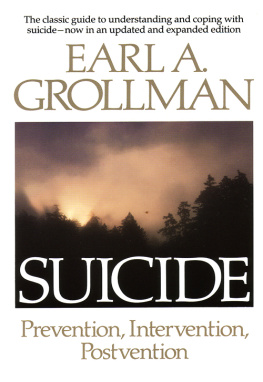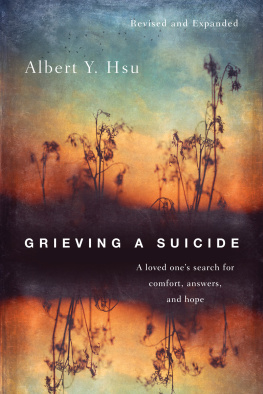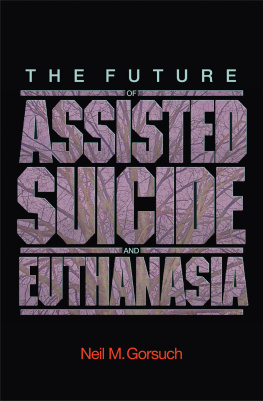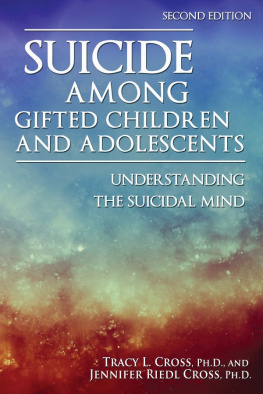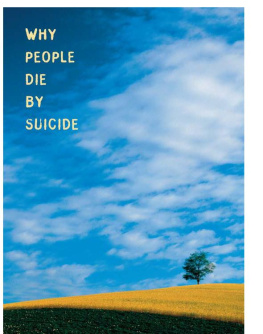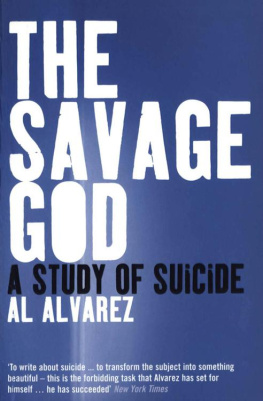Stay
Stay
A History of Suicide and the Philosophies Against It
JENNIFER MICHAEL HECHT

Copyright 2013 by Yale University.
All rights reserved.
Lines from Lucretius, On the Nature of Things, are reprinted with permission of The
Johns Hopkins University Press from Lucretius, On the Nature of Things: De rerum
natura, pages 2627, copyright 1995 by The Johns Hopkins University Press.
This book may not be reproduced, in whole or in part, including illustrations, in any
form (beyond that copying permitted by Sections 107 and 108 of the U.S. Copyright
Law and except by reviewers for the public press), without written permission
from the publishers.
Yale University Press books may be purchased in quantity for educational, business,
or promotional use. For information, please e-mail sales.press@yale.edu (U.S. office)
or sales@yaleup.co.uk (U.K. office).
Set in Minion type by Integrated Publishing Solutions, Grand Rapids, Michigan.
Printed in the United States of America.
Library of Congress Cataloging-in-Publication Data
Hecht, Jennifer Michael, 1965. Stay : a history of suicide and the philosophies
against it / Jennifer Michael Hecht.
pages cm
Includes bibliographical references and index.
ISBN 978-0-300-18608-6 (cloth : alk. paper) 1. Suicide. 2. Suicide
Prevention. 3. Communities. I. Title.
HV6545.H372 2013
179.7dc23 2013016107
A catalogue record for this book is available from the British Library.
This paper meets the requirements of ANSI/NISO Z39.48-1992
(Permanence of Paper).
10 9 8 7 6 5 4 3 2 1
For you who struggle and hold on
Contents
Preface
It was through my scholarly work that I first grew interested in the subject of what people live for in difficult situations, especially when they have no religion, as was the case with many of the people I wrote about in my book Doubt: A History. It was through my personal life that I became interested in suicide. In 2007 an old friend and successful poet, Sarah Hannah, whom I had known from graduate school at Columbia University, took her own life. Had she not told me about her sadness, I wouldnt have guessed: she had good friends and a teaching job she loved, she was young and beautiful, and she was writing whip-smart, psychologically rich poetry. At the time I had been going through some frighteningly dark emotional times myself, and so while her death was not incomprehensible to me, it was intensely shocking nonetheless. Our mutual friend from graduate school, Rachel Wetzsteon, another poet, felt that same shock and expressed it in an afterword to Sarahs posthumous poetry book. Then in 2009, just after becoming the poetry editor at the New Republic and completing another highly praised semester of teaching, Rachel took her own life as well. These events knocked me around, forced me to confront how we today think about our lives and deaths, and drew me to ask questions of history and philosophy, the realms I always turn to seeking understanding. A year or so after Sarah died I was planning a scholarly essay about the conclusions I had reached. Before I could write it, I found myself trying to take in the fact that Rachel was gone too.
A few weeks after I heard that Rachel killed herself, I wrote an open-letter essay about it for a website I blog for, The Best American Poetry. I began by stating plainly that I was feeling rattled by the death. My husband had recently run into Rachel on the High Line, the Manhattan park built on old elevated train tracks; I related the encounter, he with our kids, she with her boyfriend, all walking around, looking at the flowers, looking down at the city. Then I addressed the reader with a bold imperative: So I want to say this, and forgive me the strangeness of it. Dont kill yourself. Life has always been almost too hard to bear, for a lot of the people, a lot of the time. Its awful. But it isnt too hard to bear, its only almost too hard to bear. In the West, I wrote, the dominant religions had told people suicide was against the rules, they must not do it; if they did they would be punished in the afterlife. People killed themselves anyway, of course, but the strict injunction must have helped keep a billion moments of anguish from turning into calamity. These days we encourage people to stay alive and not kill themselves, but we say it for the persons own sake. Its illegal, sure, but no one actually insists that suicide is wrong. I announced: Im issuing a rule. You are not allowed to kill yourself. When a person kills himself, he does wrenching damage to the community. One of the best predictors of suicide is knowing a suicide. That means that suicide is also delayed homicide. You have to stay.
I told my readers that I was grateful to everyone who remained alive. I was thinking of specific poets I know who I thought might stumble upon my post or find it in searching for information on Rachel. I imagined these men and women on the edge of doing what she had done, and I knew many other people unknown to me were struggling; I hoped that they might read my plea, might heed my plea. They were out there, maybe at their desks, and I was inside, at my desk; I was moved to support them, and with a little effort I could feel them supporting me. I claimed that some part of them doesnt want to end it all, and said to that part, Im throwing you a rope, you dont have to explain it to the monster in you, just tell the monster it can do whatever it wants, but not that. Later well get rid of the monster, for now just hang on to the rope. I know that this means a struggle from one second to the next, let alone one day at a time. I said, Sobbing and useless is great! Sobbing and useless is a million times better than dead. A billion times. Thank you for choosing sobbing and useless over dead. The essay ended: Dont kill yourself. Suffer here with us instead. We need you with us, we have not forgotten you, you are our hero. Stay.
The essay drew a large response on the Internet, prompting an editor of the Ideas section at the Boston Globe to contact me and ask to publish it in the Sunday paper. The Globe printed it on a lovely blue background over a half-page. In the days and months that followed I received a lot of email from people who had read the essay. I heard from men and women who had lost parents to suicide, and several who had lost a child. I heard from people who had once been suicidal and people who were suicidal now. I remember a woman worried for her teenaged son and a husband in despair for his suicidal wife. They thanked me for saying what they hadnt been able to say: Stay. They had not known how to ask.
I was, and still am, especially moved by people who tell me that my word and ideas got them through a bad time. The urgency of this made me dedicate myself to the present project, difficult though it has been to think so deeply and constantly on such a painful topic.
After Id written this manifesto in the heat of emotion, and gotten a significant positive response, it became necessary to recheck all the claims that held the argument together. Did religion take a stand against suicide across most of Western history? How and why? Even more important, how true was the claim that suicide influences others to suicide? Is it demonstrably true that one of the key predictors of suicide is knowing a suicide? What about this idea of a monster in you that needed to be outsmarted until it could be chased awaydoes this metaphor imply that no one is fully in his or her right mind when ending it all? Then I went looking for philosophers and other writers who had declared that human beings contribute just by continuing to persist in life and rejecting suicide despite anguish. I also surveyed what had been said about the consistent nature of the self over time in relation to such a final act as suicide. The results of these investigations surprised me. The only idea that I had presented that I did not find in my studies was the notion that we owe each other gratitude for staying alive. This book contains what I have learned in my historical and sociological research into these matters and my thoughts on what all of this may mean to us today.
Next page


